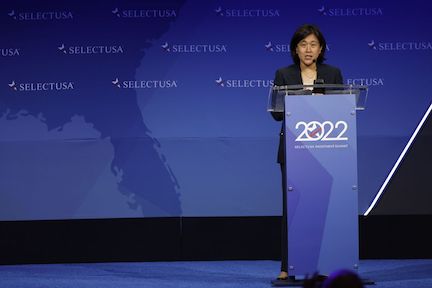President Joe Biden’s trade chief said that she expects to have her first meeting with Mexico’s new economy minister “very soon,” and that US concerns about the nation’s energy policy are broader than the impact on individual companies.
The US is continuing consultations with Mexico that began in August, Trade Representative Katherine Tai said in an interview at Bloomberg’s Washington office Friday. For the Mexican side, those talks are now set to be led by Raquel Buenrostro, the former tax-agency head who President Andres Manuel Lopez Obrador tapped for her new job earlier this month.
But Tai wouldn’t rule out requesting the formation of a panel to resolve the conflict, which she said earlier this year puts at risk more than $10 billion in US investment based on the arbitrary treatment of firms, especially in renewables.
“When you are the complainant, you are in the driver’s seat,” Tai said. The US will remain in talks “for as long as those consultations are meaningful,” she said.

Lopez Obrador’s policy privileges Mexican state-owned oil producer Petroleos Mexicanos and the electricity provider known as CFE. The US says this violates the US-Mexico-Canada Agreement on trade, which went into force in 2020 to replace the two-decade-old Nafta pact. Canada filed a similar request for talks over Mexico’s electricity policy.
The unfair treatment is about “more than just impacts on individual companies,” Tai added.
Requesting arbitration opened as an option for the US after a 75-day mandatory period for the discussions under the USMCA expired at the start of this month. But the US and Mexico agreed to extend the negotiations beyond that initial time frame, as allowed under the agreement.
Lopez Obrador denies that his policies violate the pact, saying that the US must respect Mexico’s sovereignty.
If a panel were to rule against Mexico, it might have to pay tariffs on as much as $30 billion in exports, former officials who negotiated the agreement told Bloomberg News around the time that the US and Canada first lodged the complaint in July.
Many analysts saw Lopez Obrador’s choice of Buenrostro as a hardening of his stance toward trade issues. As tax chief, she brought in billions of dollars via a crackdown on big companies owned by some of Mexico’s wealthiest businessmen, alleging them of abusing loopholes.








